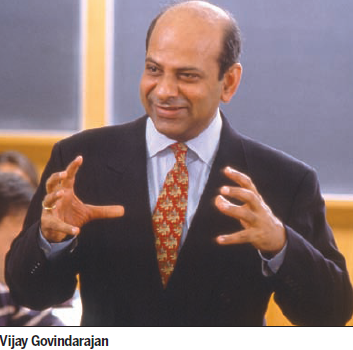'Reverse Innovation' to define a new phase of globalization
Updated: 2012-06-08 14:51
By ARIEL TUNG (China Daily)
|
|||||||||
Western companies will shift to creating innovative products for customers in developing countries before selling them as low-cost goods back home. That's the view of Vijay Govindarajan, co-author of Reverse Innovation: Create Far From Home, Win Everywhere and a leading expert on strategy and innovation.
 |
Historically, innovation has flowed from rich to poor nations. But this well-established dynamic will yield, Govindarajan and Chris Trimble write, to an increasingly common one in which innovation happens in a way that caters first to the demand for low-cost products in China, India and other developing markets.
Govindarajan, a professor of international business at Dartmouth College, and his colleague Trimble call this phenomenon "reverse innovation".
Products developed under this new model are then sold in developed countries at low prices,creating, in turn, new markets and uses for the innovations.
Recently in New York to promote his book, Govindarajan told China Daily that opportunities for developed countries are "limitless" in China because of its huge consumer base.
"For so long, Chinese companies have made products really cheap for the Western market,"he said. "What they really need to do now is to focus on their domestic market, and China is a vast country."
Govindarajan cites several examples of the emerging paradigm in his book's title. Reverse innovation was behind the development by General Electric Co of an adordable ultrasound scanner for rural China that is now marketed in over 100 countries including the United States, where industrial conglomerate GE is based.
"It's not possible for most Chinese people to a4ord the regular premium ultrasound which costs $350,000. The $15,000 ultrasound developed for China has created a huge market in the world," the author said.
Other examples: Logitech developed a computer mouse for the Chinese market priced around $20 that’s now a hit in Europe and the US, and Deere & Co built and priced a small tractor speci-cally for India and it's now sold worldwide.
The bottom line is that consumers in emerging markets are intelligent and appreciate quality.
"Like consumers in developed nations, they desire good products. But what they decide on is very di4erent because the context is different: They are poor. Therefore you have to create a new solution for them," Govindarajan said.
"Steve Jobs, back in the late 70s, decided to create a computer that cost a few thousand dollars as opposed to hundreds of thousands of dollars. He's saying, Why can't the rest of America have access to a computer? That's the kind of thinking you need."
"Reverse innovation" was coined in 2009 when Govindarajan co-wrote with GE CEO Je4 Immelt a Harvard Business Review article, "How GE Is Disrupting Itself," during a stint as the company's chief innovation consultant. The Harvard publication rated reverse innovation one of the 10 big ideas of the decade.
The article explained how GE inverted its traditional business model. Rather than continuing on the path of developing highend products and modifying them for emerging markets, the Connecticut-based giant began developing local echnologies in those markets and distributed them globally.
Besides designing the a4ordable ultrasound system for China, GE also produced a new handheld electrocardiogram device for India that sells for as little as $1,000.
Govindarajan, who has worked with more than a quarter of Fortune 500 companies, including Coca-Cola, IBM,Procter & Gamble and Sony,believes emerging markets will become breeding grounds for breakthrough innovations in diverse -elds such as housing,health care, energy, transportation,financial services and telecommunications.
Reverse innovation implies cost-savings for the world, the author said.
"Western consumers have begun to feel constrained after the 2008 financial crisis. We can't just be wasting things. Here is now a debate on bringing health care costs down. The world will absolutely enjoy good-quality products at a much lower cost.That's what they need."
Govindarajan's own innovation has been recognized by several publications. BusinessWeek named him a Top 10 business school professor in corporate executive education, Forbes called him one of the Top 5 most respected executive coaches on strategy, and UK newspaper The Times honored him as a Top 50 management thinker.
Contact the writer at atung@chinadailyusa.com

 Relief reaches isolated village
Relief reaches isolated village
 Rainfall poses new threats to quake-hit region
Rainfall poses new threats to quake-hit region
 Funerals begin for Boston bombing victims
Funerals begin for Boston bombing victims
 Quake takeaway from China's Air Force
Quake takeaway from China's Air Force
 Obama celebrates young inventors at science fair
Obama celebrates young inventors at science fair
 Earth Day marked around the world
Earth Day marked around the world
 Volunteer team helping students find sense of normalcy
Volunteer team helping students find sense of normalcy
 Ethnic groups quick to join rescue efforts
Ethnic groups quick to join rescue efforts
Most Viewed
Editor's Picks

|

|

|

|

|

|
Today's Top News
Health new priority for quake zone
Xi meets US top military officer
Japan's boats driven out of Diaoyu
China mulls online shopping legislation
Bird flu death toll rises to 22
Putin appoints new ambassador to China
Japanese ships blocked from Diaoyu Islands
Inspired by Guan, more Chinese pick up golf
US Weekly

|

|







